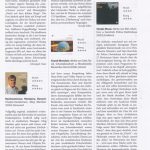GRAMOPHONE
April 2000
Rachmaninov
Morceaux de fantaisie, Op 3. Piano Sonata No 2 in B flat minor, Op 36 (rev. ver), Variations on a theme of Corelli, Op 42.
Oleg Marshev (pf) / Danacord DACOCD525 / 67 DDD
Following his highly praised Prokofiev cycle for Danacord, Oleg Marshev turns to Rachmaninov, whom Prokofiev outwardly despised but inwardly admired. Born in Russia but based in Italy, Marshev reveals his roots in every brooding and impassioned bar. Scorning an easy virtuoso aplomb, he takes us to the poetic core of the Second Sonata, a turbulent masterpiece best heard in its original 1913 version rather than the 1931 revision played here. Even given the composer’s lugubrious dismissal of his first thoughts, his feeling that they were overly ornate and extended, his 1931 version is brutally truncated and the sequences so central to his style are modified to a harsh degree. But Marshev offers a magnificent performance, having all the time in the world to make his points, turning what can easily become a mere display piece (so often served up for superficial effect on the competition circuit) into something strikingly sombre and powerful.
He is even more authentically attuned to Op. 3 with his intense, heartfelt rubato in the Elegie (again, no suave or polite evasion here, but an all-Russian fullness and despondency) and with a central fff blaze of punishing strength and passion. The Serenade, too, is audaciously and romantically inflected, and only the Corelli Variations provide a less compulsive and revelatory experience. The haunting slavonic waltz of Variation 15 hardly needs such persistent desynchronisation of the hands to achieve its dolcissimo, and if’ Variation 18 is red-blooded in sonority it is more stolid than con brio. But if Marshev’s way with Op 42 is too expansive for the music’s good, he is sufficiently masterful and individual elsewhere to make one anxious to hear him in more Rachmaninov: in, say, the Preludes and Etudes-tableaux. Danacord’s sound is good and all lovers of Rachmaninov’s dark slavonicism should hear this.


